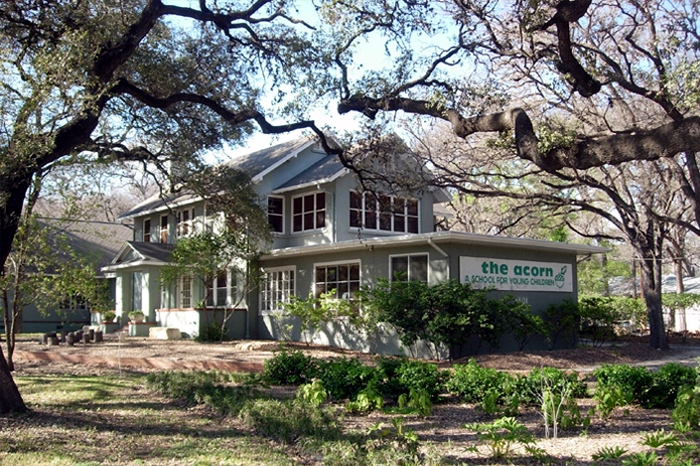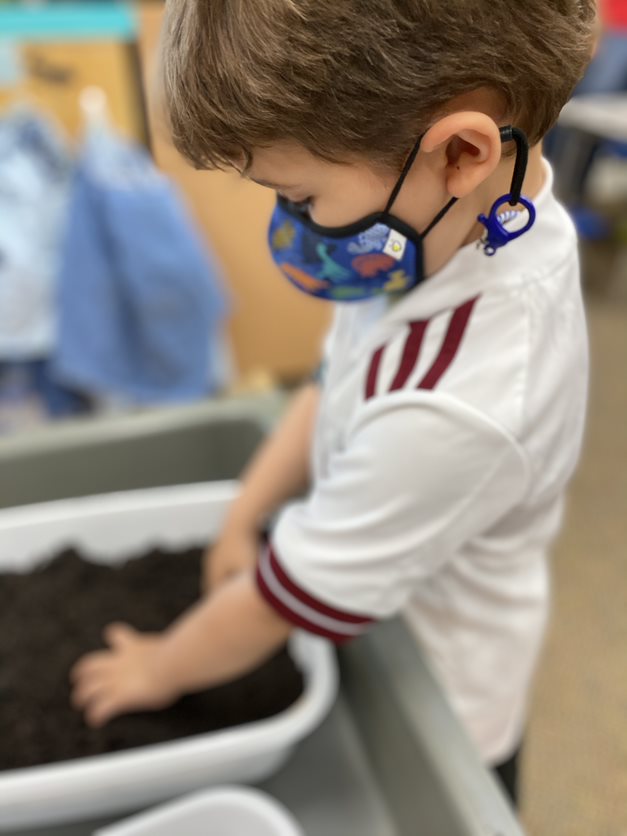
We are proud to share this post focusing on The Acorn—A School for Young Children, a high-quality early childhood program in the heart of San Antonio. Look to the bottom of this page for links to more information about preschools, pre-K, and early childhood education.
The Acorn—A School for Young Children
3501 Broadway, San Antonio, TX 78209 (map)
210-826-8804
Wendy Starnes, Director
Rich and Kitty Lange, Founders
“Mighty oaks from little acorns grow.” That’s the philosophy behind The Acorn—A School for Young Children. With a focus on developmental, child-led education, The Acorn fosters a lifelong love of learning by meeting children where they are and helping them build a foundation for success both in and out of the classroom.
Culture at The Acorn School
Nestled among majestic trees in the heart of San Antonio, The Acorn School offers pre-K and kindergarten classes for children ages 3–6. Following the principles established by child development pioneers and psychologists Jean Piaget and Erik Erikson, children learn at their own pace using methods appropriate to their stage of development.
“These forefathers of child development concluded after extensive research that there is no ‘right’ time for a child to learn a skill like reading or potty training,” explains Rich Lange, who, along with his wife, Kitty, established The Acorn School in 1980.
He adds that every child is on a unique internal timetable and should not be required to master a skill earlier than is developmentally appropriate.
“That can crush the child’s self-confidence rather than build it,” he continues. “It is defeating.”
The Langes both hold Master’s Degrees in Child Development from Michigan State University and started a preschool in Lansing before moving to San Antonio. They firmly believe in setting children up for success and have structured The Acorn to support that mission, starting with the school’s shorter hours.
‘We believe that an 8–3 school day is too long for young children,” says Lange, explaining that pre-K is available in two half-day sessions, five days per week. Families choose from either 8:40–11:30 AM or 12:40–3:30 PM, each with a different teacher.
“We bring in new teachers for the afternoon sessions because they are fresh and can give 110 percent,” explains Lange.
Kindergarten takes a hybrid approach, starting the year with two half days and three “full” days that run from 8:40 AM to 2:00 PM. That model flips halfway through the year to a three/two model to prepare children for the demands of first grade. All classrooms cap at 20 students with a one-to-five teacher/student ratio in pre-K and three teachers per classroom in kindergarten. Currently, there are 131 children enrolled in The Acorn School, but thanks to a 1,000-square-foot addition in 2017, the campus can accommodate up to 150 students.
“There is a huge misconception that we are always on a waitlist,” says Wendy Starnes, Director, and former Acorn parent. “With our expansion, that is not a current issue.”

Curriculum at The Acorn School
The majority of learning at The Acorn happens through doing. Therefore, hands-on activities are a big part of the curriculum, with games, blocks, art, and manipulatives playing a significant role. You won’t find workbooks and other handouts here. That’s because the students served by The Acorn are in the concrete stage of learning, defined as the ages between 12–18 months and six years.
“Workbooks are part of the symbolic stage of learning, which starts around age six,” explains Starnes. “That’s when children are developmentally ready for concepts like 2 + 3 = 5 on a piece of paper.”
Instead, the children learn the same mathematical concepts using blocks, beads, and other tangible items.
“There is an intent behind everything the children do here daily,” says Starnes. “We expose them to multiple concepts but allow them to learn at the appropriate level.”
That includes reading, a skill many educators stress above all others, often to the child’s detriment. “We want to create joyful, lifelong readers,” says Starnes.
To that end, they teach perceptual skills with sequencing, beading, and puzzles as a way to, as Starnes says, “break the code to learn how to read.”
“The organization of how a puzzle goes together, or how you follow a sequence, crossing the midline from left to right, is instrumental in teaching children how to read,” she explains.
Starnes adds that the stress and mental health of our children has taken a hit over the past couple of years, a fact she attributes in part to the “No Child Left Behind” policy, which focuses less on what is developmentally appropriate and more on pushing children through the learning process.
She also attributes it to screen time, which is why The Acorn is a screen-free zone. Many experts recommend that children under two have no exposure to digital screens, with a mere one hour suggested for children between two and six. Studies show that more than that results in low attention spans, a high risk of ADD and impulsivity, and decreased creativity.
“Research shows that 90 percent of the brain connections develop by age six,” says Lange. “You must do the right things to stimulate those connections.”
Community at The Acorn School
Starnes is the first to admit that The Acorn is not what she describes as a “convenient” school, meaning there is no early drop-off, after-school care, or financial aid available. However, it is a friendly, loving, family-focused environment with teachers and parents working as a team to ensure the child’s success. Teachers set individual goals for each child based on daily observations and assessments. They identify any red flags and work with parents to address concerns and develop a strategy for success.
Parents are encouraged to participate in annual events, including the kindergarten Amtrak train ride to San Marcos and the kindergarten camp out at Lost Maples. In addition, because the school is non-denominational, leaders recognize all religious and cultural celebrations and encourage students and their families to share their traditions.
It is a community with a shared belief that children should be free to be just that—children. Through that freedom, children gain the confidence they need to carry them past the grounds of the Acorn and into the real world. However, many students return during their senior year of high school for the annual Senior Reunion to hang out with favorite teachers, relive their favorite Acorn School memories, and play on the playground one more time.
“We honor children, and we honor childhood,” says Starnes. “We build self-confidence and make learning so fun and interesting that the students can’t wait to come back and learn more.”
To set up a school tour, visit theacornschool.net or call 210-826-8804.
Charter Moms Chats
Watch Wendy Starnes, Director of The Acorn—A School for Young Children, and Rich Lange, Co-founder of The Acorn—A School for Young Children, speak with Inga Cotton on Charter Moms Chats on April 4, 2023 at 4:00 PM Central live on Facebook and YouTube.
Wendy Starnes is the Director of The Acorn—A School for Young Children.
Rich Lange is a Co-founder of The Acorn—A School for Young Children.
Read More About Early Childhood Education
- “Guide to Enrolling Your Three- or Four-Year-Old in Pre-K 4 SA,” San Antonio Charter Moms, January 26, 2023
- “Play-based Learning at JOY Holistic Education,” Adriana Becerra, San Antonio Charter Moms, April 19, 2022
- “Jennifer Semanko Shares Her Pre-K Teacher Tales from Shepherd of the Hills Lutheran School,” Jennifer Semanko, San Antonio Charter Moms, March 23, 2022
- “Catholic Preschools in San Antonio,” San Antonio Charter Moms, June 16, 2021
- “Pre-K Charter School Options and Resources in San Antonio,” San Antonio Charter Moms, January 8, 2021